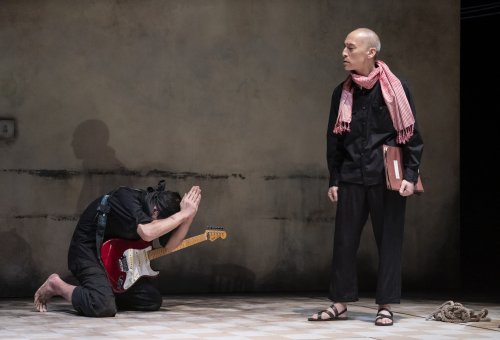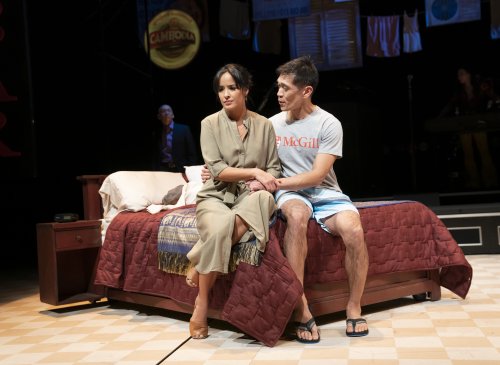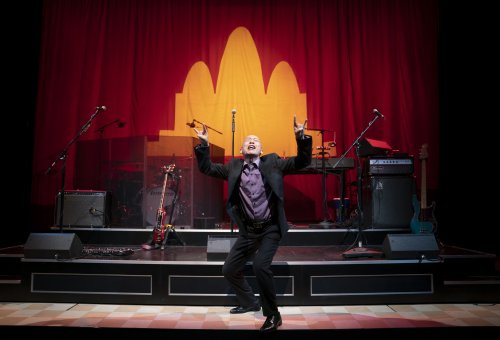Cambodian Rock Band
Lauren Yee’s first Residency 5 play at Signature Theatre is an engrossing and entertaining investigation into the Khmer Rouge takeover of Cambodia with 12 songs.

Joe Ngo, Abraham Kim, Courtney Reed, Jane Liu and Moses Villarama in a scene from Lauren Yee’s “Cambodian Rock Band” at Signature Theatre (Photo credit: Joan Marcus)
[avatar user=”Victor Gluck” size=”96″ align=”left”] Victor Gluck, Editor-in-Chief[/avatar]
Mixing fiction and fact, new Signature Theatre Residency playwright Lauren Yee’s Cambodian Rock Band is an engrossing, entertaining and appalling investigation into the Khmer Rouge’s genocide in Cambodia in the 1970’s and its aftermath. Using authentic Cambodian rock music from the 1960’s and 70’s as well as the songs of Dengue Fever, the Los Angeles-based Cambodian American band, the play is emceed by the genial Duch played by Francis Jue who turns out to be the play’s greatest villain and a real person now in prison. Chay Yew’s production is one that does not require prior knowledge to get caught up in the fictional play and the ugly, true history of Cambodia.
The play takes place in three time frames: 2008, 1975 and 1978, all taking place in Phnom Penh, the capital of Cambodia. Narrated by Jue as Duch (pronounce Doik), the story starts with Cambodian-born 51 year old Chum paying a surprise visit to his American daughter Neary, a lawyer working with the International Center for Transitional Justice on the prosecution of Khmer Rouge leader and war criminal Kang Kek Iew aka Duch. Of the 20,000 prisoners that passed through the S-21 prison camp that he oversaw, only seven are known to have survived. However, Neary has evidence that an eighth one survives.

Courtney Reed and Joe Ngo in a scene from Lauren Yee’s “Cambodian Rock Band” at Signature Theatre (Photo credit: Joan Marcus)
Her father claims to have come to take her home after her two years’ legal work in Cambodia. He jokes about being a tourist and wants to see all of the local sites including the bar of the Sheraton Hotel across from Neary’s residence. Neary quickly comes to believe that her father is the eighth survivor but he had never spoken to his family about his experiences in Phnom Penh before coming to America. When Neary goes missing, Chum vows to tell her the truth about his experiences.

Joe Ngo and Francis Jue in a scene from Lauren Yee’s “Cambodian Rock Band” at Signature Theatre (Photo credit: Joan Marcus)
The scene segues to Chum’s rock band back in 1975 just before the fall of Phnom Penh to the Khmer Rouge. At the end of the session, Chum informs his bandmates, Leng (his best friend), Sothea (Leng’s girlfriend), Rom and Pou that he and his family are leaving for Paris and that they should leave too. However, it turns out to be advice given too late.
We then jump ahead to 1978 and the S-21 prison where Chum now renamed Comrade Song is brought in as an enemy of the people for being an educated person (although musicians were also suspected by the Khmer Rouge and generally executed as decadent.) There he meets one of his former bandmates now working for the Khmer Rouge and ultimately comes to the attention of Duch himself. Both confrontations prove to be very dramatic. Ultimately back in 2008, Chum finds his daughter and plays her the only surviving tape of his rock band.
While the play and its story are fascinating as well as horrifying, it is the shifts in tone and style that are problematic even though the use of Duch as the narrator, who eventually enters the story, as well as the band interludes, tend to cover them up. Several actors play more than one role quite successfully without the confusion which has often lately been the case. Takeshi Kata’s several settings mostly solve the play’s location shifts, while the costumes by Linda Cho beautifully deal with the three time periods, just as David Weiner lights the three parts differently.
Chay Yew has obtained fine and believable performances both dramatically and musically from his cast of six who play 11 characters. Francis Jue has the most difficult part playing the sarcastic, mocking narrator/emcee and later the cruel and inhumane director of the infamous S-21 prison, who in his defense claims he was only doing his job. He manages to make them one and the same in the course of the evening, though he is much more upbeat as the emcee, and more sinister as the prison head. The story’s throughline makes Joe Ngo’s Chum the central character as he appears both with his daughter and then in the flashback scenes which are about his experiences with the Rhmer Rouge. He is genial, wry and circumspect, all useful qualities for his character. (Some of the stories used in the play are from his family history.)

Courtney Reed and Moses Villarama in a scene from Lauren Yee’s “Cambodian Rock Band” at Signature Theatre (Photo credit: Joan Marcus)
Courtney Reed is both his focused daughter Neary and Sothea, a member of the band and its lead vocalist. As Neary, she becomes very emotional both with her father and boyfriend Ted. Moses Villarama is both understanding and compassionate as Ted, while as Leng, Chum’s best friend and bandmate is much less emotionally secure, particularly when he realized that Chum was planning to leave Cambodia without telling him. He is also at the verge of a nervous breakdown as a prison guard who has seen too much horror. Abraham Kim and Jane Lui play excellent bandmates as well as other needed characters later on in the story.
All of the actors take part in the band performances as the Cambodian Seventies group, The Cyclos. The majority of the songs are by the Los Angeles-based Cambodian-American band Dengue Fever, though several are from famous Cambodian artists from the 1960’s and 70’s who were disappeared during the Khmer Rouge period. Described in the script as “raucous, LOUD, bubblegum, dissonant psychedelic surfer rock,” the songs fit the bill. They are mainly sung in Khmer (the language of Cambodia) but occasionally also sung in English. In classic rock fashion, the instruments include electric guitar, bass guitar, drums/percussion, keyboard, with Reed on vocals and Jue on tambourine.

Francis Jue in a scene from Lauren Yee’s “Cambodian Rock Band” at Signature Theatre (Photo credit: Joan Marcus)
Lauren Yee, who won the Harold and Mimi Steinberg/American Theatre Critics Association New Play Award for Cambodian Rock Band, has created a fascinating look into a world little known to New York theatergoers. By turns humorous and violent, Cambodian Rock Band reveals some of the personal stories behind the headlines which have already become yesterday’s news. This is also the work of a commanding playwright who has already won many awards and should win many more in the future.
Cambodian Rock Band (extended through March 11, 2020)
Signature Theatre
Irene Diamond Stage at The Pershing Square Signature Center, 480 W. 42nd Street, in Manhattan
For tickets, call 212-244-7529 or visit http://www.signaturetheatre.org
Running time: two hours and 25 minutes with one intermission






Leave a comment